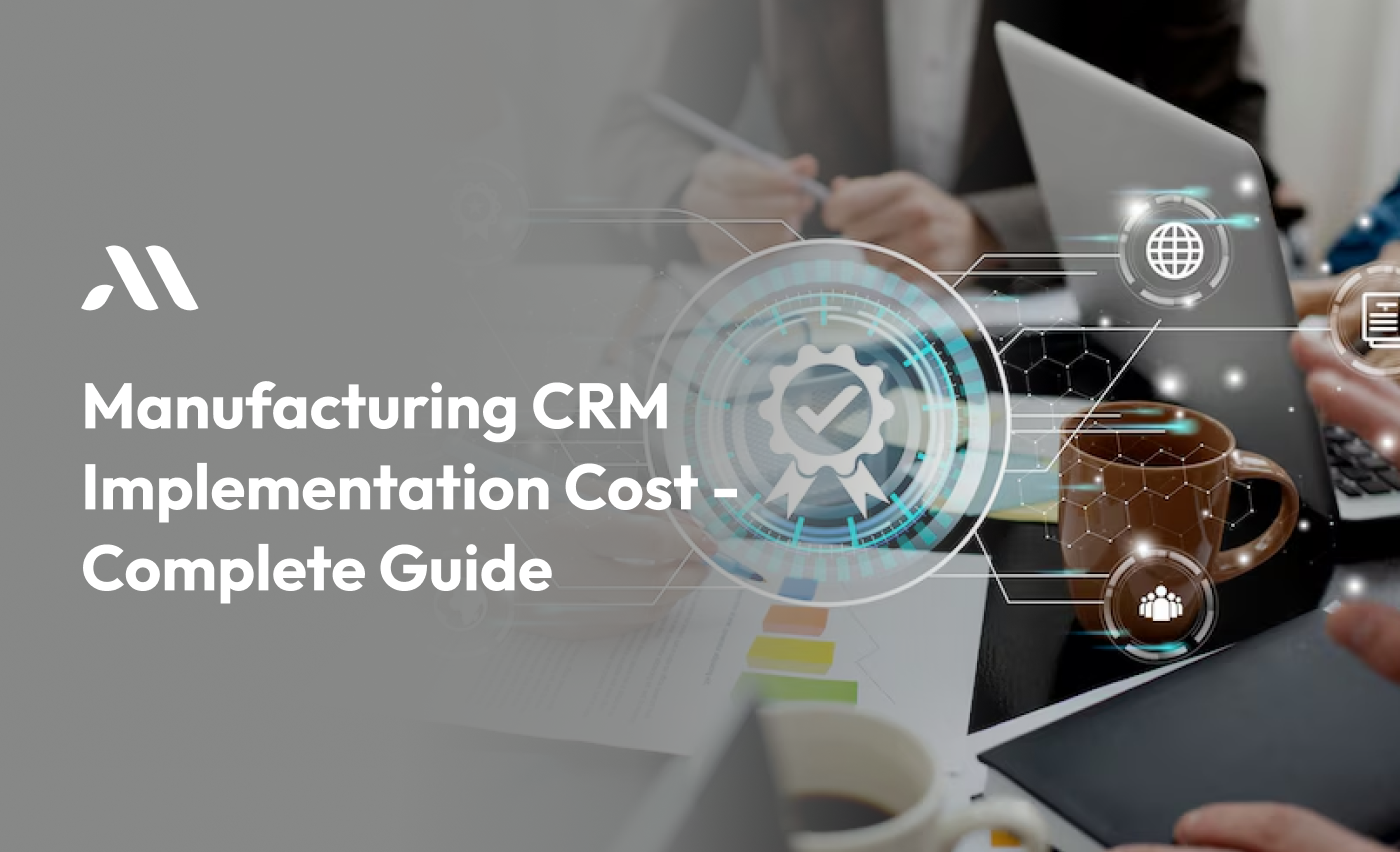In today’s world, Managing customer relationships is more important than ever, especially for manufacturing businesses. This is where a Customer Relationship Management (CRM) system comes into play. But how much does CRM implementation cost? This guide will help you understand everything you need to know about the CRM implementation cost, especially for manufacturing businesses.
- 91% of companies with more than 11 employees now use a CRM system, showing how crucial it is for businesses to stay competitive.
- CRM systems can boost sales by up to 29%, which is a significant increase for any manufacturing business.
- The average ROI (Return on Investment) for a CRM system is $8.71 for every dollar spent, making it a worthwhile investment.
Note: These statistics show that the CRM implementation cost is not just an expense, but an investment in the future of your business.
What is CRM Implementation?
Before jumping into the cost, let’s talk about what CRM implementation is. CRM implementation means setting up a software system that helps a business manage its interactions with customers. It can help track sales, manage customer service, and even simplify operations. In manufacturing, this system is important for keeping everything organized and running smoothly.
“Implementing a CRM system is like adding a turbocharger to your manufacturing business. It helps you go further, faster.”
Factors That Affect CRM Implementation Cost
When talking about CRM implementation cost, it’s important to know that many factors can impact the total cost. Let’s break them down:
Software Type: The type of CRM software you choose has a big impact on cost. There are two main types:
- On-premise CRM: This requires buying the software and installing it on your company’s servers. It’s usually more expensive upfront but gives you full control.
- Cloud-based CRM: This type is hosted online, and you usually pay a monthly fee. It’s less expensive to start but can add up over time.
Customization: Every manufacturing business is unique, so you can need to customize your CRM system. Customization can include adding special features or making sure the CRM works well with your existing tools. The more customization you need, the higher the cost.
Number of Users: The more people in your company who will use the CRM, the higher the cost. Many CRM systems charge based on the number of users.
Training: Your team will need training to use the new CRM system. The cost of training can vary depending on how complex the CRM is and how many people need training.
Integration with Other Systems: If you want your CRM to work smoothly with other software you use, like accounting or inventory management systems, this can add to the cost.
Support and Maintenance: After the CRM is set up, you’ll need ongoing support and maintenance to keep it running smoothly. Some CRM providers include this in the cost, while others charge extra.
How Much Does CRM Implementation Cost?
Now that we know the factors that affect the cost, let’s talk about numbers. The CRM implementation cost can vary widely based on the factors mentioned above. Here are some average cost estimates:
Small to Medium-Sized Manufacturing Businesses: The cost of implementing a CRM system can range from $5,000 to $50,000. This includes the cost of the software, customization, training, and support.
Large Manufacturing Businesses: For larger companies with more complex needs, the cost can go up to $100,000 or more.
Average Cost of CRM Implementation: On average, the cost of CRM implementation for a manufacturing business is around $20,000 to $40,000. However, this can vary based on the specific needs of your business.
Note: These are just average numbers. The actual cost of implementing a CRM system for your manufacturing business could be higher or lower depending on your specific requirements.
Tips to Reduce CRM Implementation Cost
While CRM implementation costs can seem high, there are ways to reduce the cost without sacrificing quality:
Choose a Cloud-Based CRM: If you’re looking to save on upfront costs, a cloud-based CRM might be a good option like Odoo. It usually has lower initial costs, and you can spread out the payments over time.
Start Small: Instead of trying to implement every feature at once, start with the basics. You can always add more features later as your business grows.
Invest in Good Training: Proper training can save you money in the long run. If your team knows how to use the CRM effectively, you’ll get more value out of it.
Work with a CRM Development Company: Hiring a Custom CRM Development Company can help ensure that the implementation goes smoothly. They can also help you find ways to save money during the process.
Remember: The goal of a CRM system is to make your business more efficient. Don’t cut corners that could end up costing you more in the long run.
Also Read - CRM Trends in 2024 - Top Industry Trends
Importance of CRM in Manufacturing
Now that we’ve covered the CRM implementation cost, let’s talk about why CRM is important in manufacturing:
Improved Customer Relationships: A CRM system helps you keep track of your customers’ needs and preferences. This can lead to better customer satisfaction and loyalty.
Increased Efficiency: With a CRM, you can automate many tasks, such as sending follow-up emails or tracking orders. This saves time and reduces the chance of errors.
Better Data Management: A CRM system helps you to store all your customer data in one place. This makes it easier to access important information and make informed decisions.
Enhanced Collaboration: With a CRM, different departments in your company can share information easily. This leads to better teamwork and more efficient operations.
Final Thoughts
Understanding the CRM implementation cost is essential for any manufacturing business owner looking to improve their operations. While the cost can vary, investing in a CRM system can lead to significant benefits, including better customer relationships, increased efficiency, and higher profits.
When planning for CRM implementation, consider all the factors that affect the cost, such as software type, customization, and training. By making smart choices and following the tips provided, you can manage the CRM implementation cost-effectively and set your business up for success.
Ready to take your manufacturing business to the next level? MicraSol is here to help! Our expert team specializes in affordable CRM implementation and app development customized just for you. Boost efficiency, improve customer relationships, and grow your business with MicraSol. Let’s build your success together Contact us today!
Remember: The right CRM system can be a game-changer for your manufacturing business. It’s an investment that can pay off in more ways than one.
FAQS
What is a CRM system, and why do I need one for my manufacturing business?
A CRM (Customer Relationship Management) system helps you manage all your interactions with customers. It can track sales, store customer information, and help your team work together better. For manufacturing businesses, a CRM system makes it easier to keep track of orders, improve customer service, and boost efficiency.
How much does CRM implementation cost?
The cost of implementing a CRM system can range from $5,000 to $100,000, depending on the size of your business and your specific needs. On average, most manufacturing businesses spend between $20,000 and $40,000.
What factors affect the cost of CRM implementation?
Several factors can affect the cost, including the type of CRM software you choose (on-premise or cloud-based), the amount of customization needed, the number of users, training costs, integration with other systems, and ongoing support and maintenance.
Can I save money on CRM implementation?
Yes, there are ways to reduce costs. For example, choosing a cloud-based CRM can lower upfront expenses. Starting with basic features and adding more later can also help. Investing in good training ensures your team uses the CRM effectively, which can save money in the long run.
Is a CRM system worth the investment for my manufacturing business?
Absolutely! A CRM system can help improve customer relationships, increase efficiency, and make better use of data. It’s an investment that can lead to higher profits and a more organized business.








